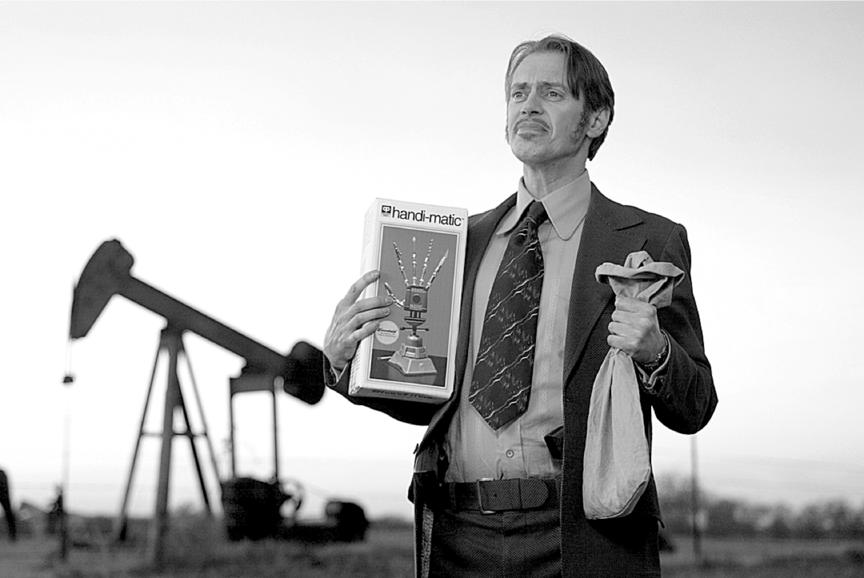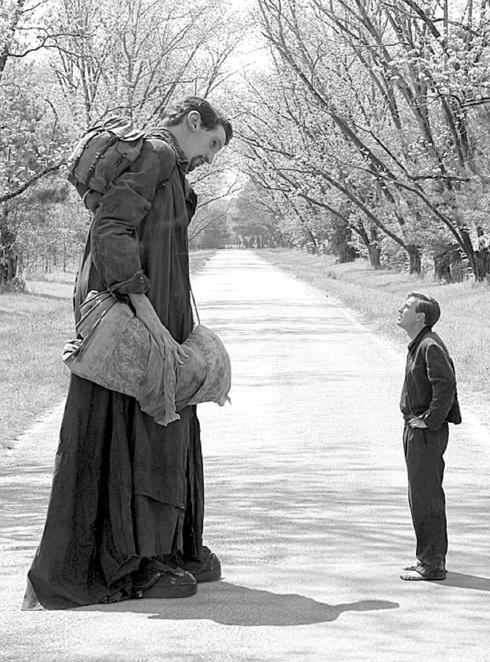After the questionable commercial merits of Planet of the Apes, Burton returns to more intimate territory. At the same time, the birth of his first child and the death of his father seem to have lent new gravity to the antisocial auteur's work. Based on Daniel Wallace's cult novel of the same name, Big Fish introduces us to Will Bloom (Almost Famous' Billy Crudup, increasingly comfortable on screen). Will is an uptight, no-nonsense international stock broker who finds himself yanked back to his small Southern hometown to deal with the impending death of his estranged father, Edward Bloom (a very good Albert Finney). Will has never gotten along with his father, due in large part to the senior Mr. Bloom's penchant for spinning outrageous tall tales.
The film begins with Mr. Bloom's favorite tale (told at every opportunity throughout his son's life) about a giant fish and a wedding ring. It's a lovely tale, but it's clear that Will has heard this whopper one too many times. In fact, looking back on it, Will has probably never heard one true word from his often absent father's mouth. Is it too much to ask, as his father lies dying, for a little genuine connection with the man behind the whoppers?
There are really two stories at work in Big Fish. The first involves Will patrolling his father's deathbed, dealing with the emotional backlash from his mother (Jessica Lange, also quite good) and trying to get a straight answer from his “papa was a rolling stone” father. The other takes us back in time, telling Ed Bloom's “small town boy does good” life story in glorious, truth-stretching detail. Though it involves giants, mermaids, werewolves and witches, Ed swears every word is true.
These “fantasy” sequences (featuring Ewan McGregor as the young Ed) are obviously what attracted Burton to the project. Wrapped in a warm coat of '40s nostalgia, these sequences seem a bit restrained for the man who gave us Beetlejuice. But, at their absolute best, (a sequence in which Ed meets the love of his life and “time stops”) they are wondrous to behold. The dying daddy moments, on the other hand, seem rather pedestrian. Burton isn't one for stereotypical Kleenex moments, and these sequences seem like they could have been lifted wholesale from Love Story, Terms of Endearment, Dying Young or just about any tear-inducing movie in which a sickly person spends an inordinate amount of time expiring in bed.
Burton should be congratulated for doing something a bit more mature, but the end result seems oddly restrained and is likely to sit uneasily with long-time Burton backers. In other words: Don't expect action figures. That said, there are many wonderful moments in the film. The cinematography is gorgeous; dripping with bright colors and rarified southern light, like an oil painting come to life. Seven-foot, six-inch Matthew McGrory as young Ed's towering sidekick is a wonder to behold on screen. The romantic interplay between Finney and Lange sparkles like fireflies. The screenplay by John August (who will still have to win several Oscars to make up for the two Charlie's Angels movies he wrote) balances the two worlds (fantasy and reality) well. We're left with the feeling that even though a certain percentage of Ed's stories might be true, he's still a lying rapscallion.
In the end it must be noted that Burton delivers the groceries, giving us a genuinely touching coda, showing clearly and concisely why telling a little white lie might be preferable to knowing the big dark truth. It is in this moment that Burton reaches a beautiful accord between the wild-idea-filled fantasist of yore and the increasingly mature dramatist of today. Big Fish may be a mixed bag, but it augurs great things to come from our boy Burton.




